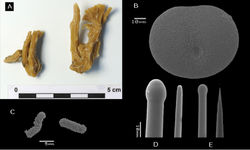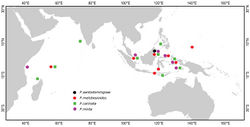Placospongia santodomingoae
| Notice: | This page is derived from the original publication listed below, whose author(s) should always be credited. Further contributors may edit and improve the content of this page and, consequently, need to be credited as well (see page history). Any assessment of factual correctness requires a careful review of the original article as well as of subsequent contributions.
If you are uncertain whether your planned contribution is correct or not, we suggest that you use the associated discussion page instead of editing the page directly. This page should be cited as follows (rationale):
Citation formats to copy and paste
BibTeX: @article{Becking2013ZooKeys298, RIS/ Endnote: TY - JOUR Wikipedia/ Citizendium: <ref name="Becking2013ZooKeys298">{{Citation See also the citation download page at the journal. |
Ordo: Hadromerida
Familia: Placospongiidae
Genus: Placospongia
Name
Placospongia santodomingoae Becking, 2013 sp. n. – Wikispecies link – ZooBank link – Pensoft Profile
Holotype
RMNH POR. 4486, Indonesia, East Kalimantan province, Maratua island, Buli Halo anchialine pool, 02°11'16.4"N, 118°37'06.4"E, 0–1m. depth, xi.2008, coll. N.K. Santodomingo & Estradivari, #BER128/mol1147. Paratypes. RMNH POR. 4487, Indonesia, East Kalimantan province, Maratua island, Buli Halo anchialine pool, 02°11'16.4"N, 118°37'06.4"E, 0–1m. depth, xi.2008, coll. N. K. Santodomingo & Estradivari; RMNH POR. 4488, Indonesia, East Kalimantan province, Maratua island, Buli Halo anchialine pool, 02°11'16.4"N, 118°37'06.4"E, 0–1m. depth, xi.2008, coll. N. K. Santodomingo & Estradivari, #BER128/1156.
Description
Holotype and paratypes are branching and encrusting, size 8cm in length. Total size of specimens in situ is hard to establish as parts of the body may be encrusting within cracks. Alcohol preserved and live specimens are hard but slightly compressible. The surface is made up with typical Placospongia cortical plates separated by contractible grooves which form a network on the surface. Oscules are present in the grooves. Live color of holotype was dark brown, the paratypes were orange, and these colors were mostly retained after alcohol preservation (Fig. 8A).
Spicules. Holotype (Fig. 8) megascleres large straight tylostyles with blunt point 430-605.5-660 × 13-15.5-20 × 13-18.1-23 μm, small straight tylostyles with sharp point 240-261.3-290 × 5-7.2-8 × 5-8.8-10 μm; microscleres selenasters 80-84.8-90 × 60-67.3-75 μm, acanthose microrhabds 8-12.3-18 × 2.5-2.7-3.5 μm. Range of the paratypes (Table 1) large straight tylostyles with blunt point 430-760 × 13-20 × 15-23 μm, small straight tylostyles with sharp point 190-380 × 5-13 × 8-15 μm, microscleres selenasters 63-93 × 58-75 μ m, acanthose microrhabds 5-20 × 2.5-3.5 μ m.
Skeleton. The cortical plates consist of densely packed selenasters, microrhabds form a layer over and amidst this selenaster cortex and are also prevalent in choanosomal tissue. Developmental stages of selenasters occur throughout the choanosome. Tylostyle tracts support the margins of the cortical plates in radial tracts from the centre core (consisting of densely packed selenaster) to the cortical plates. The sharp ends of the smaller tylostyles can be projected beyond the cortex surface.
Distribution
Presently only recorded from Buli Halo anchialine pool on Maratua island, Berau, East Kalimantan, Indonesia (Fig. 9). For a full description of the pool, see Becking et al. (2011)[1]
Ecology
Depth 0–2m. occurs in anchialine pool, can be exposed to air during low tide and can tolerate great fluctuations in salinity (from 24 to 33 ‰).
Etymology
Named in honor of Nadiezhda K. Santodomingo, the collector of the types, for her years of tireless work in marine science including anchialine research.
Remarks
Placospongia santodomingoae sp. n. is similar to Placospongia carinata,yet lacks streptasters and has shorter tylostyles. Placospongia santodomingoae sp. n. likewise differs from Placospongia mixta by the absence of streptasters as well as the absence of spherasters. Placospongia santodomingoae sp. n. differs from Placospongia anthosigma by the absence of anthosigma, and by having hastate endings of the smaller tylostyles.
Original Description
- Becking, L; 2013: Revision of the genus Placospongia (Porifera, Demospongiae, Hadromerida, Placospongiidae) in the Indo-West Pacific ZooKeys, 298: 39-76. doi
Other References
- ↑ Becking L, Renema W, Santodomingo N, Hoeksema B, Tuti Y, de Voogd N (2011) Recently discovered landlocked basins in Indonesia reveal high habitat diversity in anchialine systems. Hydrobiologia 677: 89-105. doi: 10.1007/s10750-011-0742-0
Images
|

